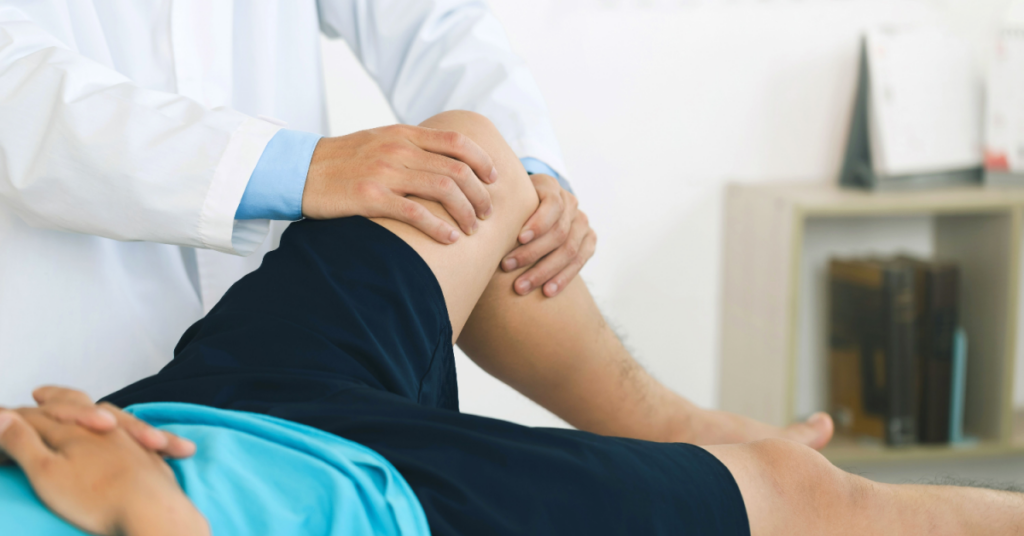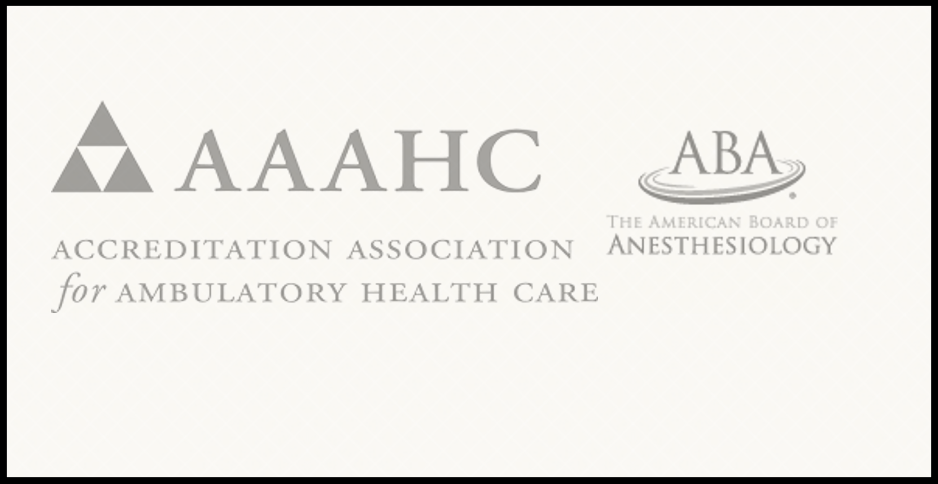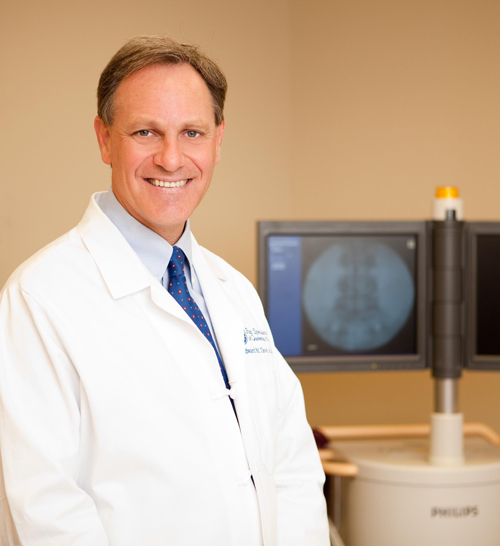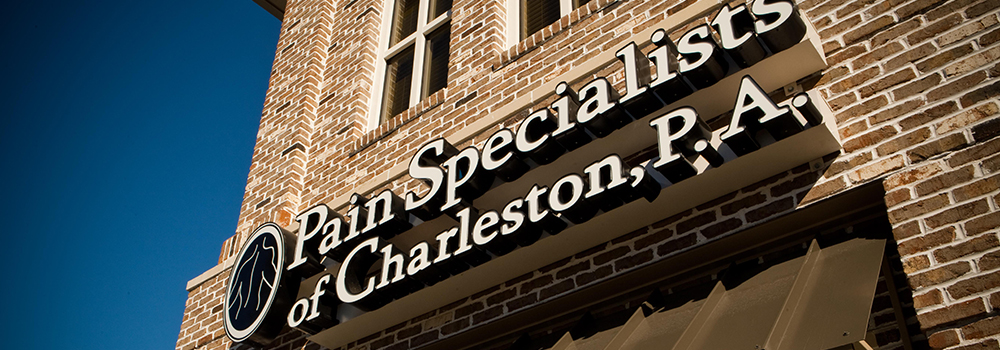Knee Pain

KNEE PAIN PHYSICIAN IN CHARLESTON, SC
Knee pain is extremely common, but it can be debilitating. Whether you’re dealing with the aftermath of an injury, or you’ve been diagnosed with arthritis, gout, or tendonitis, knee pain can disrupt your every day. Luckily, there are a wide range of treatments to alleviate your pain.
At Pain Specialists of Charleston, our team is here to get to the root cause of your pain and help you get back to feeling like yourself.
No Referral Needed — Same Day Appointments — Accepting New Patients
Request Appointment | Meet Pain Doctors | Contact Us | Visit Us
SIGNS & SYMPTOMS
- Swelling and stiffness
- Redness and warmth to the touch
- Weakness or instability
- Popping or crunching noises
- Inability to fully straighten the knee
WHEN TO SEE A DOCTOR
While knee pain can sometimes resolve on its own or with at-home treatments, there are several signs that it’s time to seek treatment from a pain management physician. You should schedule an appointment if you are experiencing one or more of the following with knee pain:
- Your knee feels unstable or cannot support your weight
- It is swollen
- You have a limited range of motion
- There are visible changes in your knee or leg, including redness
- You have a fever
CAUSES
Knee pain has a wide range of causes, including injury, arthritis, and mechanical issues. Some of the most common causes include:
- ACL Injury -A tear of the anterior cruciate ligament (ACL). Your ACL is one of the ligaments that connect your shin to your thigh. This type of injury is commonly seen in people who play sports like basketball, tennis, or soccer.
- Arthritis – This is an extremely common ailment, but you may not know that it is inflammation of a joint. There are over 100 types of arthritis, but osteoarthritis, gout, pseudogout, rheumatoid arthritis, and septic arthritis are most likely to affect your knee.
- Dislocated Kneecap -Your kneecap is a rounded bone that covers the front of your knee. When it slips out of place–usually to the outside of your knee–the knee becomes tender and painful. You may even be able to see the kneecap on the side of your leg. This is another injury that is usually caused by sports that require changing direction quickly, like basketball or tennis.
- Fractures – Fractured kneecaps usually occur during car accidents or falls. It’s extremely painful and typically requires surgery to repair.
- Hip or Foot Pain – Believe it or not, pain in your hip or foot can cause you to change the way you walk, resulting in knee pain.
- Iliotibial (IT) Band Syndrome – The iliotibial band runs from the outside of your hip to the outside of your knee. If it becomes too tight, it rubs against the outside of your thigh bone, causing pain in the knee. This can affect anyone, but distance runners and cyclists are especially prone to IT band syndrome.
- Knee Bursitis -Bursae are small sacs of fluid on the outside of your knee joint that help tendons and ligaments glide smoothly over the joint. When the bursae become inflamed or irritated, it becomes painful and limits your mobility.
- Loose Body – When pieces of bone or cartilage break off of the knee joint–usually as a result of injury or degeneration–this is known as loose body. It may not cause any issues unless the pieces interfere with movement.
- Patellar Tendonitis – Your patellar tendon runs from the front of your kneecap to your shin, and allows you to run, jump, and kick. When this tendon becomes inflamed, it causes pain and weakness. If left untreated, it can escalate to a tear. Skiers, cyclists, runners, and anyone who regularly participates in activities that require jumping are especially susceptible to this type of tendonitis.
- Patellofemoral Pain Syndrome (PFPS) – This is a general term to refer to pain between the kneecap and the thigh bone. PFPS is commonly seen in athletes or older patients who have arthritis of the kneecap.
- Torn Meniscus -Your meniscus is cartilage that acts as a cushion between your shin bone and thigh bone. Sudden twists or rotations can cause it to tear, which is painful and limits your ability to move your knee.
DIAGNOSIS
- Physical exam
At Pain Specialists of Charleston, your first visit will include a thorough evaluation that includes your medical history and a physical examination pertinent to your pain problem. This comprehensive visit with your pain specialist will last approximately 30 minutes. - Imaging tests
- X-ray
- Computerized tomography (CT) scan
- Ultrasound
- Magnetic resonance imaging (MRI)
- Lab tests
TREATMENT
At Pain Specialists of Charleston, our board-certified team offers pain management treatment in the form of:
- Injections
- Injured Nerve Block
- Radiofrequency Ablation (Rhizotomy)
- Discography
- Neurostimulation, also known as Spinal Cord Stimulation
- Medical Massage Therapy
- Clinical Trials
- …and MORE!
MEET DOCTOR EDWARD M. TAVEL, JR., MD
- Over 20+ Years of Specialty Training
- Double Board-Certified in Anesthesiology and Pain Management
AWARDS & ASSOCIATIONS

AS SEEN ON

CONDITIONS WE MANAGE
- Knee Pain
- Chest Pain
- Shoulder Pain
- Back Pain
- Hip Pain
- Neck Pain
- & More
TREATMENTS WE OFFER
- Acupuncture
- Biofeedback
- Cognitive behavioral therapy
- Massage
- Meditation
- & More
WHY CHOOSE US
At Pain Specialists of Charleston, we strive to provide an unmatched healthcare experience – one focused on finding relief. With this goal guiding our pain management physicians, we prioritize the following:
Compassionate and Comprehensive Care
Our practice takes a multidisciplinary approach to pain care that puts patients first. We’re proud to offer a full range of pain management procedures and treatments, including physical therapy, medical massage therapy, pain psychology, medication management, and more.
Timely Treatment
Because many of our patients suffer from severe pain, we’re committed to scheduling appointments as quickly as possible. This ensures the speedy start of a treatment plan to relieve and/or manage their pain.
Access to Safe Pain Management
Pain Specialists of Charleston offers a higher level of healthcare, performing all interventional procedures to meet strict, sterile standards and rigorously comply with all FDA, CDC, state, and federal medical safety guidelines.
Quality Care
Our providers are not only prominent leaders in the field of pain management, but advocates for the Charleston, SC patients we so proudly serve. It’s our exceptional care that sets us apart and earns our patients’ trust.
Request Appointment | Meet Pain Doctors | Contact Us | Visit Us
FAQS
WHAT NOT TO DO WITH KNEE PAIN?
If you are experiencing knee pain, there are certain activities you know you should avoid until you’re healed. On the other hand, you may be doing things to make it worse without even realizing it. Here are a few things to keep in mind when you’re dealing with knee pain.
- DON’T do high-impact exercises or push yourself
- DO the exercises or stretches recommended by your pain management physician
- DON’T wear just any shoes
- DO ask your knee pain doctor about the kind of shoes they recommend to support your knees
- DON’T disregard mobility aids like walking sticks or canes. These can help your knee heal faster by reducing the load on your joint.
- DO look into supplements to help your knees heal. Ask your physician about supplements like omega-3, glucosamine, and chondroitin to support healing.
For help with chronic knee pain, schedule an appointment with Pain Specialists of Charleston today! We are open 5 days a week, no referral is needed!
WHY DO I HAVE KNEE PAINS WHEN BENDING OVER?
If you experience knee pain when bending over, it may be one of many underlying causes. Meniscus tears, bursitis, strains, tendonitis, and osteoarthritis are all very common causes, although it may also be caused by bone fractures or joint infections.
IF I HAVE KNEE PAIN IS IT STILL OK TO RUN?
No, do not run if you have knee pain. Pain while running is typically caused by wear and tear of the cartilage behind the kneecap, also known as runner’s knee. We recommend taking a break from running for a week to give your knee time to recover. If you still feel pain after a week of rest, schedule an appointment with a pain management physician to get a better idea of the cause of the pain and develop a course of treatment.
WHY DOES MY KNEE HURT WHEN I SQUAT?
Knee pain while squatting is commonly caused by runner’s knee, but it can also result from a meniscus tear due to poor form, increased activity, or repetitive activity. In addition to pain, you may also experience redness and a clicking sensation when you squat.
WHY DOES MY KNEE HURT WHEN I’M SQUATTING BUT NOT WHEN I’M BENDING IT?
In addition to runner’s knee, a meniscus tear is the most common cause of pain while squatting. When the cartilage that lines the knee joint is damaged, there’s little to no cushion for the knee, which is painful.
WHAT ARE THE DIFFERENT TYPES OF KNEE PAIN?
There is a wide range of knee pain causes, including arthritis, bursitis, ligament tears, osteoarthritis, infection, and more.
WHAT ARE THE RED FLAGS FOR KNEE PAIN?
Knee pain does not always indicate a major issue, but if it comes on suddenly and severely, it likely is a serious injury. Other red flags include:
- Buckling or inability to hold your weight
- Severe pain
- A dislocated kneecap, which you can often see
- Limited mobility
- Knee locking
If you’re experiencing any of these, seek treatment from a pain management physician as soon as possible.
WHEN SHOULD I STOP IGNORING MY KNEE PAIN?
If your knee is red, swollen, or warm to the touch, it may be a sign of infection. This requires medical attention. In addition, deformity of your knee joint can indicate a broken or dislocated knee cap, which also necessitates medical treatment.
IS IT BETTER TO REST OR WALK WITH KNEE PAIN?
This depends on the cause of your knee pain and how severe it is. If your knee pain is due to a condition like arthritis, low-impact exercise like walking can help keep the joints loose and even help the cartilage regenerate.
If your pain is the result of an injury, it is best to rest until you have recovered. Exercising, even walking, can make the injury worse.
WHAT IS THE BEST POSITION TO SLEEP WITH KNEE PAIN?
If you have knee pain, the best position to sleep in is on your back with a pillow or bolster under your knees. If you prefer to sleep on your side, be sure to lay on the side that is not affected. For example, if you’re experiencing pain in your left knee, you’ll want to sleep on your right side.
SHOULD I KEEP MY KNEE STRAIGHT OR BENT WHEN IN PAIN?
Keeping your knees as straight as possible will reduce pain. Limit the amount of time you have them crossed or bent and try to move every 20 minutes or so if you have to sit with your knees bent.
WHAT HAPPENS DURING YOUR FIRST APPOINTMENT?
At your first Pain Specialists of Charleston appointment, you will walk through your medical history and knee pain with your physician. They will then perform an exam of your knee(s) and leg(s) to better understand your symptoms and create a treatment plan. What Should I Bring?
ARE YOU ACCEPTING NEW PATIENTS?
Yes, we are open to new patients. To get started, call us at (843) 818-1181 or request your appointment online.
DOES PAIN SPECIALISTS OF CHARLESTON REQUIRE A REFERRAL?
No, we do not require a referral! We accept both self-made appointments and referrals from your primary care physician. Schedule your first appointment today! BOOK NOW
DOES PAIN SPECIALISTS OF CHARLESTON OFFER SAME-DAY APPOINTMENTS?
Yes, Pain Specialists of Charleston offers same-day appointments. We are open 5 days a week and can frequently get patients in to see our board-certified pain doctors the same day. Call us at (843) 818-1181 to learn more about availability.
HOW LONG IS A PAIN MANAGEMENT APPOINTMENT?
Your first visit with your pain specialist will last approximately 30 minutes. Following appointments will vary in length depending on the recommended treatment(s). What else should new patients expect?


